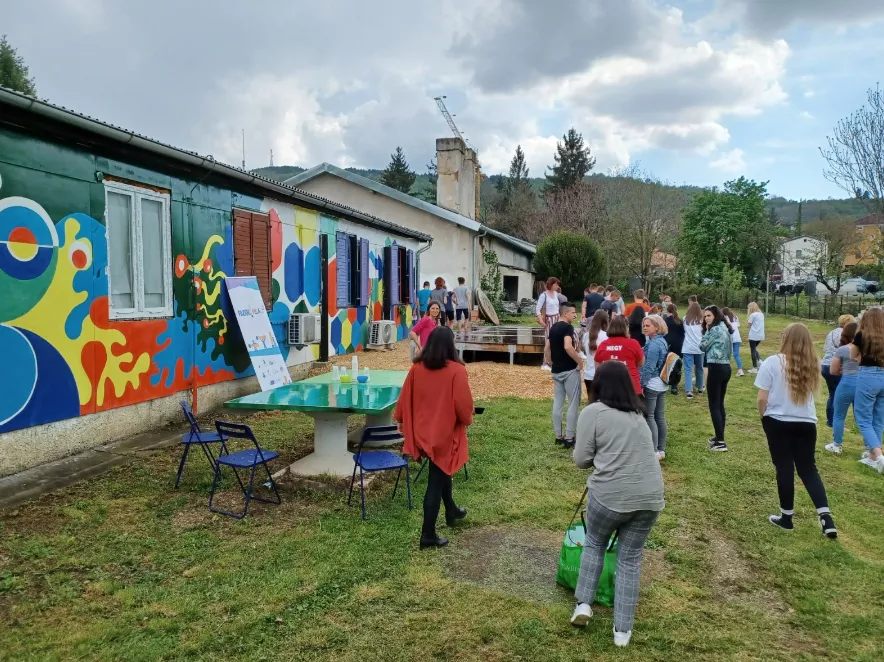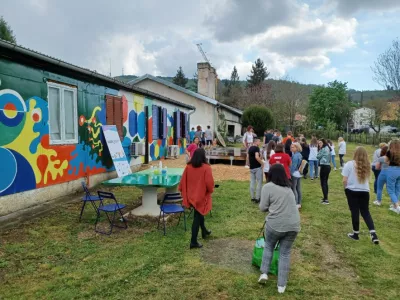Summary
The ‘BOSS’ project implements a participatory budget process to foster active participation among young people aged 13-15 in the rural primary school of Draganić, Croatia. This process involves allowing rural youth to propose, vote on, and oversee the allocation of public funds for community projects.
Through activities such as civic education sessions, budget analysis, simulation exercises, and workshops on management, communication and presentation skills conducted in the schools, the project enhances democratic skills, promotes a sense of responsibility, and develops financial, project management, and entrepreneurial skills among the youth.
Results
- A total of 70 young participants were involved in the project implementation. This included five educational workshops, one youth participation event, one youth participation mobility trip, development of project ideas, and three meetings with decision-makers.
- The young participants enhanced their abilities to: search for information about municipal, county, and school operations; flag community problems; design project ideas; and understand democratic processes at local, national, and European levels. Participants got hands-on experience with non-formal learning methods and the work of decision-makers and various stakeholders.
- Three youth-led projects were fully implemented: design and equipment of an outdoor classroom; installation of an external pressure water tap and of an eco-friendly exercise equipment to promote physical activity.
- The project produced a set of educational materials for youth workers.
Resources
Documents
Context
The Croatian municipality of Draganić lacked participatory experience and youth citizen engagement mechanisms. Young people did not have access to information and opportunities to engage in democratic processes, which resulted in low knowledge and interest, and minimal youth involvement in decision-making.
To address these issues, the Local Action Group (LAG) Vallis Colapis, jointly with the Draganić municipality and elementary schools, tested a participatory budgeting model. This involved engaging youngsters in a process of meaningful participation while strengthening their civic education knowledge and managerial skills.
Objectives
-
Encourage young people’s active participation in decision-making processes in the local community;
-
Strengthen dialogue between young people and decision-makers through an innovative and effective tool within a comprehensive strategy to enhance democracy, responsibility, and project development in schools;
-
Promote the development of young people’s financial, project management, entrepreneurial, and communication skills.
Activities, key actors, and timeline
-
LAG Vallis Colapis experts, along with external specialists in non-formal education, conducted a series of workshops for young people at the school. These workshops simulated local government and EU-level decision-making processes, and taught communication, presentation, and small-scale project management skills.
-
The project held three meetings between youth and decision-makers, including city council members and local stakeholders, in which the young participants could apply the methods learned. The project partners, jointly with the youth, then reflected on and evaluated these encounters.
-
Under the mentorship of educators, the youth developed their project ideas for the participatory budget.
-
The project set up a Youngsters Council consisting of ten students who were not previously engaged in project activities. They evaluated and selected the best ideas for the participatory budget.
-
Three local initiatives proposed by youth were successfully implemented, each with a grant of EUR 1 000 from the project budget.
-
The project organised study visits to the towns of Pazin and Pula to disseminate the participatory budgeting process done through the ‘BOSS’ project. Additionally, it held a national conference to present project activities and results, and explore future opportunities with rural primary schools, associations, youth councils, regional authorities and young people.
-
The project implemented an evaluation process where young people created and regularly completed learning maps and personal action plans, reflected on their learning outcomes after each activity, and provided written feedback through evaluation forms to monitor progress and suggest improvements.
-
Building on the project’s success, the LAG launched a second phase in 2024, further extending the impact of youth participation in decision-making processes.
Success factors/lessons learnt
-
Key success factors include: thorough needs assessment; well-planned activities; and extensive experience in non-formal education and youth work.
-
The project is the first of its kind in the local community. It addresses a previously neglected topic and introduces a novel, participatory budgeting tool and model.
-
The practice is highly replicable in other regions, provided there is a detailed assessment of young people’s needs.
-
The project’s sustainability relies on strong cooperation with decision-makers and local stakeholders to pave the way for new initiatives and projects.
Contacts
Petra Foršek Koški: petra.forsek.koski@vallis-colapis.hr, +385 99 4714474

